14 Ways Your Friends Are Making You Fat
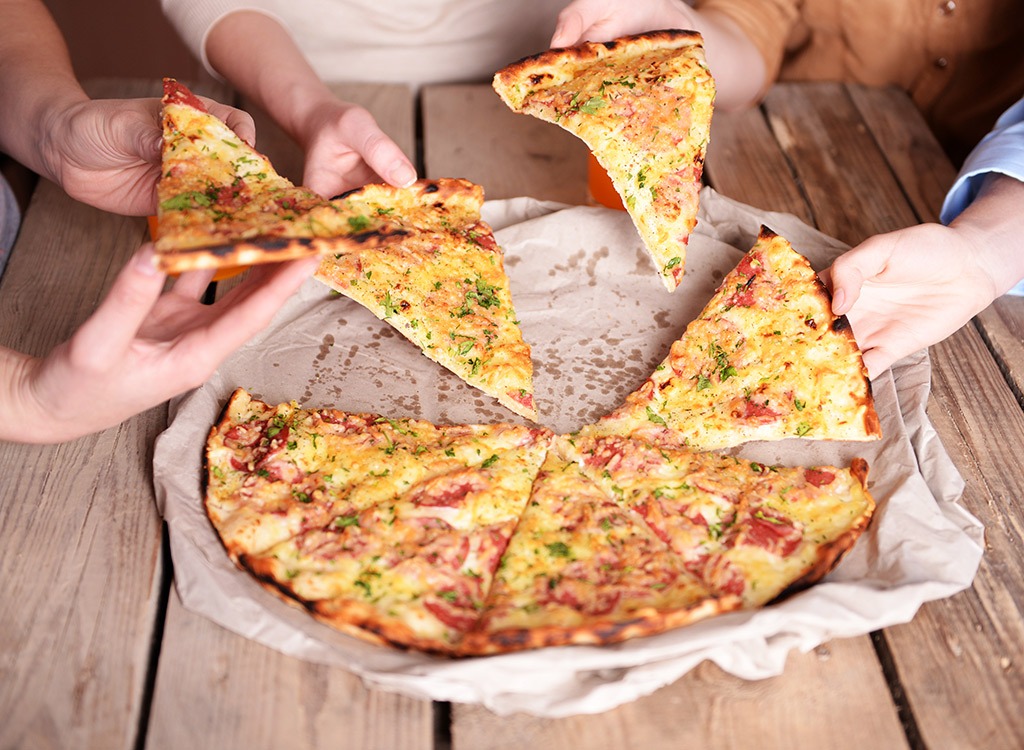
Let's play word association. If I say "contagious disease," chances are, you'll say something like "the common cold" or "the flu." Probably not obesity. As it turns out, obesity is socially contagious—an epidemic that, according to the landmark Framingham Heart Study and numerous others, spreads rapidly through social networks faster than a viral video. Researchers found that having a friend who became obese over the 32-year study increased the likelihood the participant would also become obese by a whopping 57 percent.
Although scientists don't fully understand how obesity spreads, they think it has to do with the influence communities have on what its members perceive as acceptable —whether that's eating cheeseburgers for breakfast, exercising less, or simply getting chubbier.
While an active social life is arguably part and parcel of a healthy, balanced lifestyle, your group of friends could be having a negative impact on your waistline. That's not to say you should ditch your friends entirely. Although birds of a feather flock (and feed) together, you could set a healthy example for the whole group. You can start with these 55 Ways to Boost Your Metabolism.
You Go Out with a Big Group
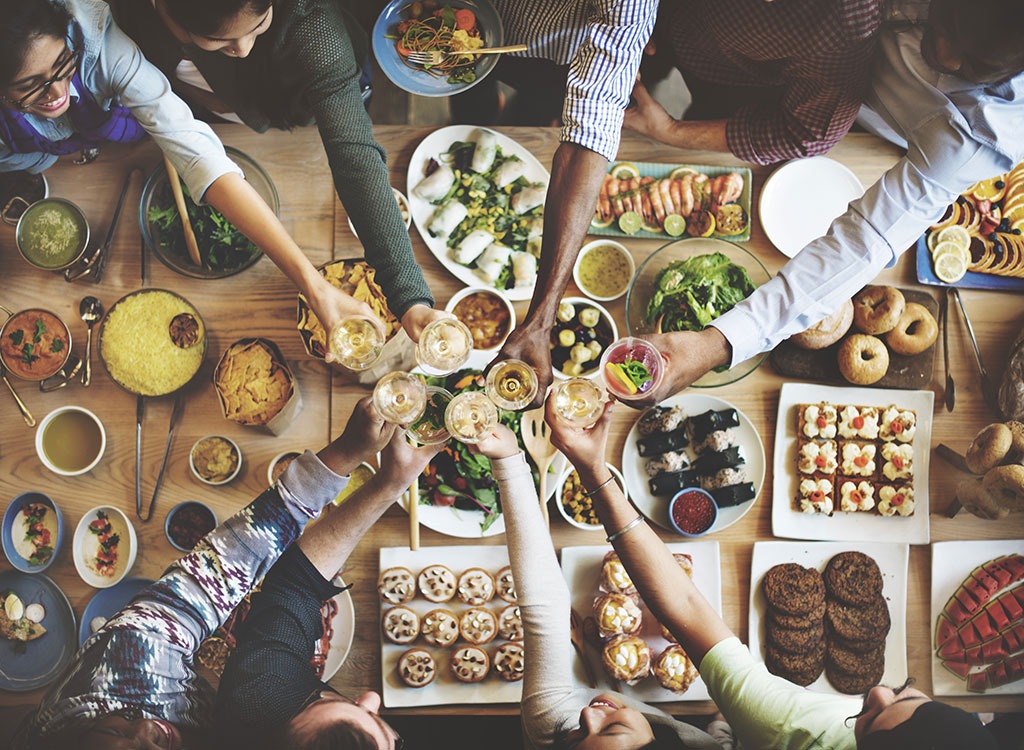
When we eat with other people we consume, on average, 44 percent more food than we do when dining alone. Research published in the journal Nutrition found that eating a meal with one other person was 33 percent larger than a meal savored alone. It gets scarier from there. Third-wheeling with two friends? You're looking at a 47 percent bigger meal. Dining with 4, 6 or 8+ friends was associated with meal increases of 69, 70 and 96 percent, respectively. Though part of this has to do with the amount of time we spend at the table when dining with company, another study from the journal Appetite found people who spent longer eating because they were simultaneously reading didn't eat significantly more, meaning time isn't the only factor at play here.
You Have a Close Friend Who is Naturally Thin

Everyone has that one friend who seems to defy all metabolic laws and maintain a thin figure while eating whatever they want. News to further annoy you: hanging out with them while they pig out may cause you to do the same. A study in the Journal of Consumer Research had college students watch a movie and snack with either a skinny or overweight companion. When the thin friend overate, college students were apt to follow suit, but they exercised more self-control when snacking with a heavier overeater.
You're Married to Your Bestie

For better or … fatter? Research suggests a committed relationship has the potential to wreak havoc on your diet. A study in the American Journal of Public Health analyzed the impact spouses, friends and siblings played on dietary patterns over the course of 10 years; couples had the greatest influence on one another's eating habits, particularly when it came to drinking booze and snacking. The good news is the "halo effect" applies to healthy habits too. A Harvard Public School of Health study found people on a weight-loss program who had the support of at least one partner lost 6.5 pounds more than those going at it alone. So sign your spouse or friend up to be your partner in getting fit.
Restaurant Meals Are Always 'cheats'
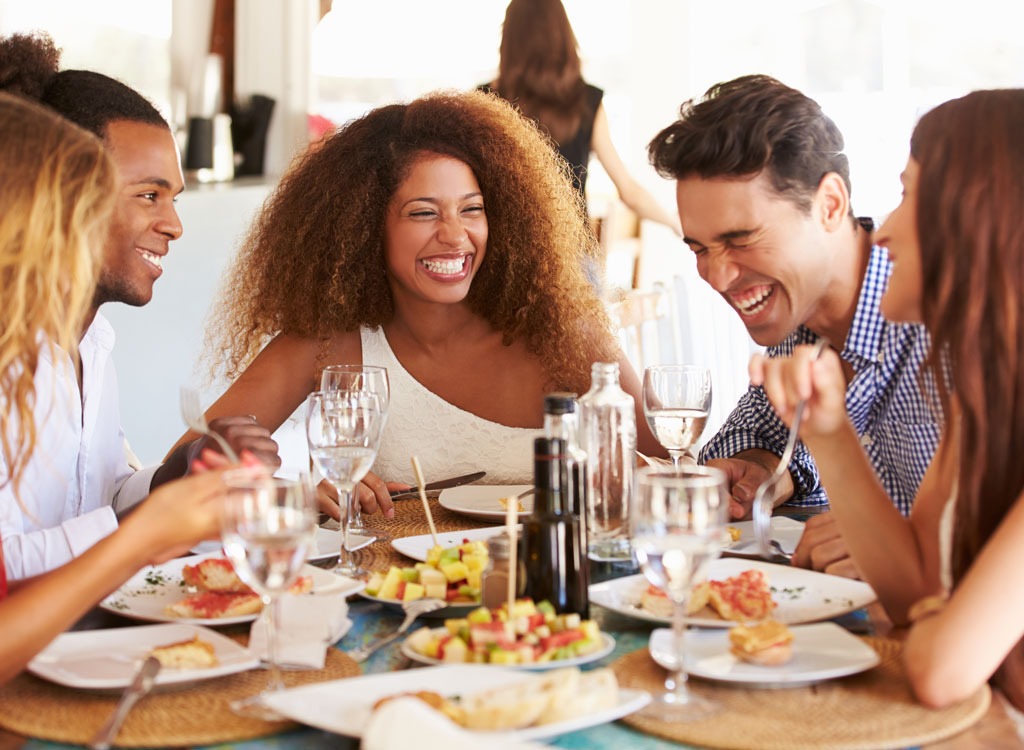
If you want to eat healthy when dining out with a group of friends, keep healthy company … or order first! A University of Illinois study found that groups of people tend to order similarly, especially when forced to say their order out loud. The researchers attribute the results to the fact that people are happier making similar choices to their peers. If you're determined to make healthy choices, stick to your decision and get your order in first. If you're still looking to indulge, check out our 16 Cheat Meal Strategies for Weight Loss.
You Stay Connected on Facebook

We wish there was a dislike button. Spending hours on Facebook, Instagram, and Pinterest when you could be up-and-about burning calories is a growing health concern, health experts say. A study of 350 students from the University of Ulster in Northern Ireland found that the more time they spent on Facebook, the less time they spent exercising or engaging in team sports. Particularly fattening is catching up with your social networks before bed—in bed even. A study in the Pediatric Obesity journal found students with access to one electronic device in their bedrooms were 1.47 times as likely to be overweight as those with no devices in the bedroom. That increased to 2.57 times for kids with three devices. Turn that catch-up session into an in-person meet-up and, no, not at a restaurant. Get together for a team sport or a physical activity to spend time with friends without staring at a screen.
Your Outings Always Involve Alcohol

It's normal to want to catch up with your crew over a few beers, especially if you're looking to unwind and have fun. But if every time you hang out it's at a boozy brunch or over happy hour specials, it could lead to weight gain. And the larger the friend group, the more in trouble you are; a 2015 study from the University of California, San Francisco found that people consume more drinks per hour if they're with a large group. Not only is binge drinking bad for your overall health (your poor liver!), it causes you to ingest hundreds of additional calories: A shot of vodka, a light beer, and a 5-ounce glass of wine all have around 100 calories. But that's without any mixers; once you add in juice, soda, or tonic water, you're looking at at least 100 more calories. If your drink of choice is a craft beer or frozen concoction, that's up to 300 or so calories each. Plus, alcohol inhibits your ability to make good decisions, which is why those plate of nachos or fried chicken wings sound like a great idea by the third round of drinks. Feel free to share some adult beverages with your friends, but limit it to only a couple rounds. For more tips on making healthy drinking decision, check out our Eat This, Not That! For Drinkers guide.
They Peer Pressure You

"Come on, one dessert won't kill you." Sound familiar? If this is a common phrase you hear from your friends, you're more likely to pack on the pounds. Even if your pals don't realize their teasing is actually peer pressure, it's hard to say no to a group of people you care about. The more people you surround yourself with, the harder it is to resist peer pressure.
They're Heavier Than You
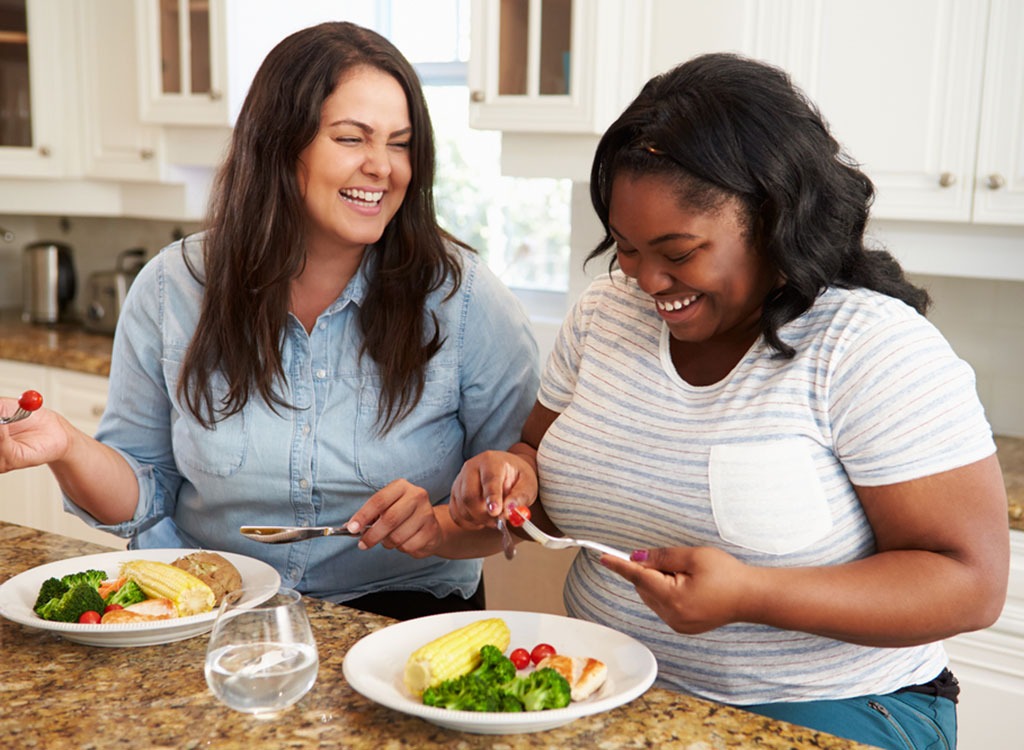
Although many physiological factors can impact your weight, lifestyle definitely plays a role when it comes to obesity. You aren't just what you eat; you're also what your friends eat. If you regularly hang out with people who are more overweight than you and have unhealthy habits, like blowing off workouts and eating more processed food, it could rub off on you. As important as maintaining your friendships is, make sure you stay strong in your healthy habits and goals.
They Don't Exercise
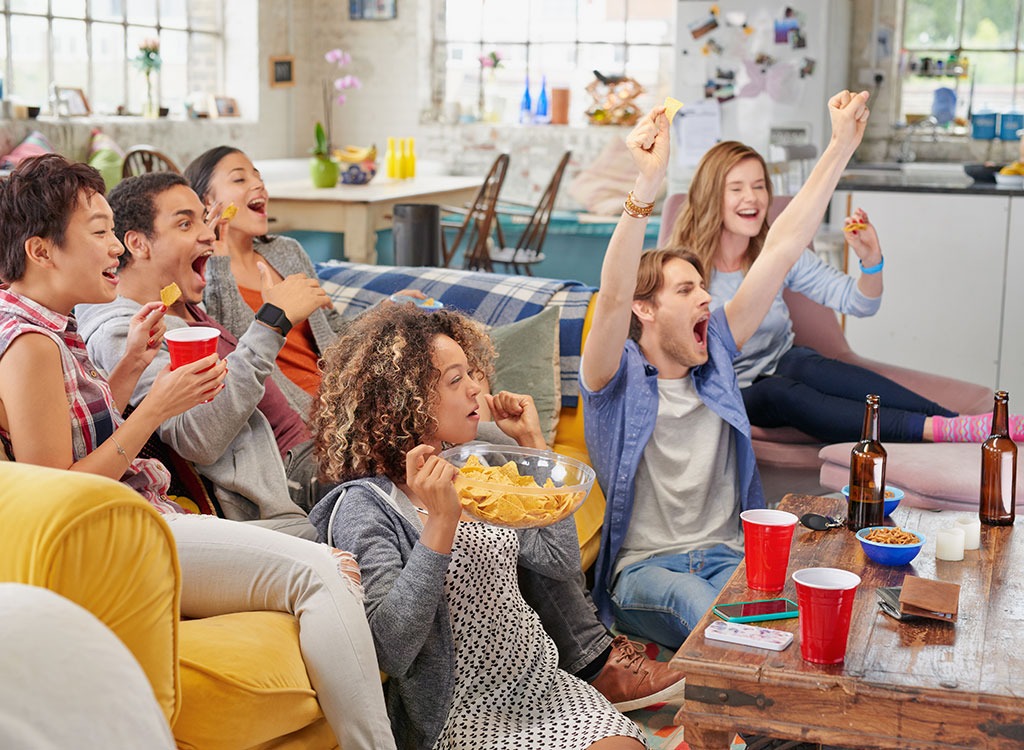
Sure, going to the movies or out to dinner sounds way more fun than, say, hitting the gym with your friends. But if your pals enjoy more sedentary activities, it could make you pack on the pounds. A study out of the University of Aberdeen found that people are more likely to exercise and push themselves harder if they have a buddy to go with. So be sure you pick some sweaty activities to do as a group, whether that's hiking, biking, or signing up for a spin class together. You're all much more likely to stay committed, and you'll burn way more calories than you would during a movie night in.
They're Not Supportive

As great at you think your friends are, they could be sabotaging your healthy eating habits without even realizing it. If you're making more of an effort to order lighter menu items at restaurants or wake up early to hit the gym, it's hard to meet these goals if your friends aren't supportive. If you surround yourself with people who discourage your healthy lifestyle, then you're more likely to fall off the wagon. Make sure you reiterate to your friends just how important your goals are — no, you don't want to split the onion rings and yes, you have to go to bed early. If they're still sabotaging, then it might be time to surround yourself with people who actually have your best interests in mind.
They Have Bad Eating Habits
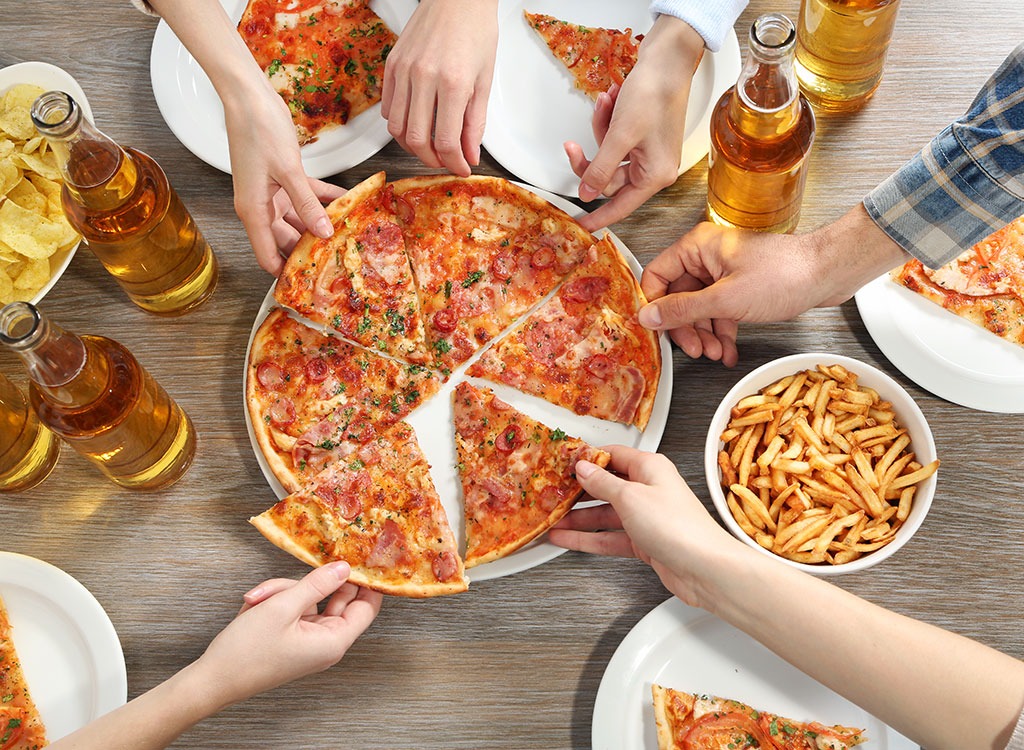
It's much easier to pick up on unhealthy eating habits if you're constantly around them. A study published in the American Journal of Public Health found that people tend to mirror what their friends do, especially when it comes to eating and dining out. You're more likely to choose the refined carbohydrate option over whole grains, munch on the free chips and salsa, or order dessert if people in your posse do. This can all lead to ingesting extra calories (and putting on extra weight). Even if your friends are making poor choices, make an effort to think for yourself, and make the healthier decision.
You Like to Stay Up Late

Partying until all hours of the night might be one thing when you're in college, but by the time you get older it can really wreak havoc on your health — and your waistline. A Wake Forest study found that people who sleep five or fewer hours a night have 2.5 times more belly fat than those who sleep the recommended 6-8 hours. Research has also found that people who don't get enough sleep often crave unhealthy comfort food the next day, and eat more calories than usual. Enjoy your time out, but make sure you still go to bed at a reasonable hour.
They're Resentful of Your Success

Ever notice that one friend that keeps trying to sabotage your efforts, no matter how hard you protest? He or she could be jealous of your weight-loss success. When people are feeling insecure about themselves and jealous of your weight-loss victories, they might try and drag you down with them, leading to unhealthy habits that will make the weight pile back on. Make sure you brush off the negative comments and tell the saboteur just how hurtful their actions are to your overall success.
You Hang Out with Your Work BFF
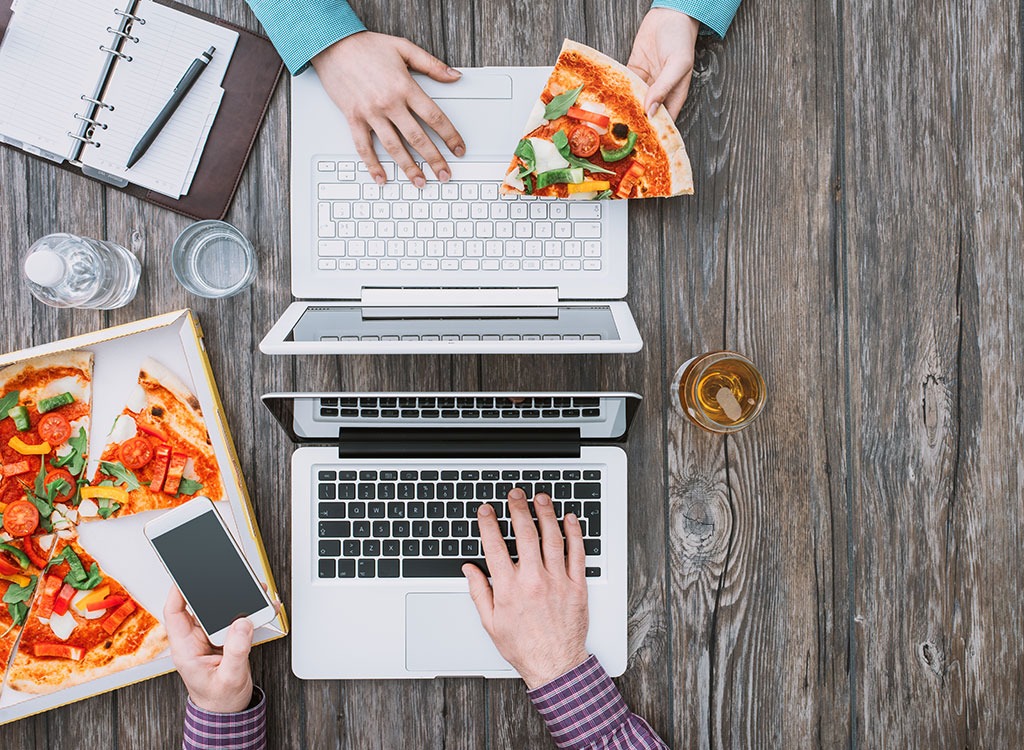
Having an office bestie can make your work actually enjoyable, and help the long day pass by much faster. But it can also be a recipe for disaster, especially if you're trying to lose weight. How often has your pal at work peer pressured you into eating just one cookie in the break room, or splitting one of those decadent-looking cupcakes? Tagging along with your BFF to work happy hours also means you're more likely to stay chit-chatting… and drinking more boozy beverages. Lunch outings together could lead to overindulging, without realizing it, even if you think you're making a healthier choice. Research published in the European Journal of Clinical Nutrition found that people end up consuming about the same amount of calories at both full-service restaurants and fast food joints — about 190 more calories than normal — but people ingest more sodium and cholesterol at sit-down places. If you want to grab lunch with your work wife, opt for something to go; the same study found people only ate an extra 120 calories when they ordered take out rather than eating in the establishment. For more foods making you fat, don't miss this list of The 50 Unhealthiest Foods on the Planet!








